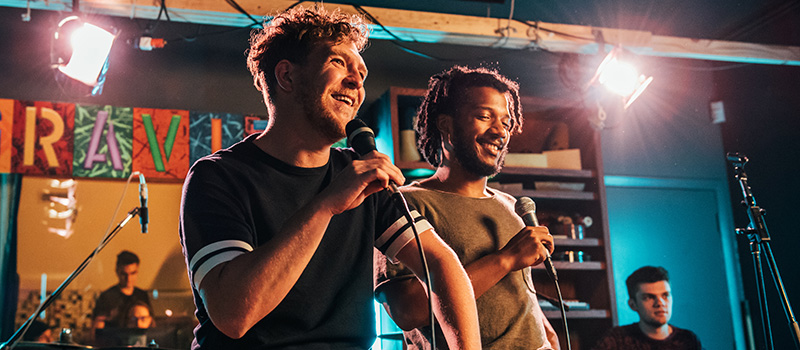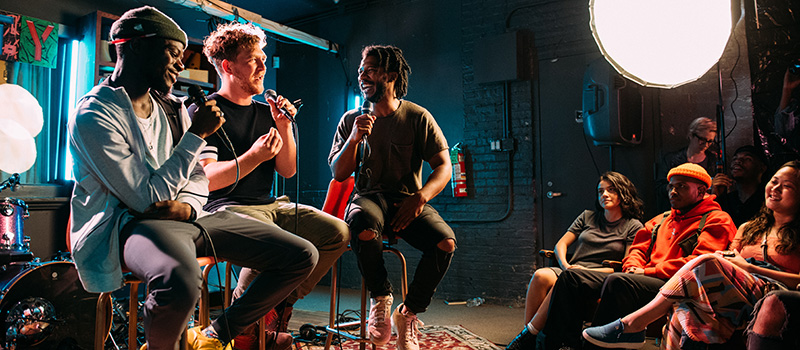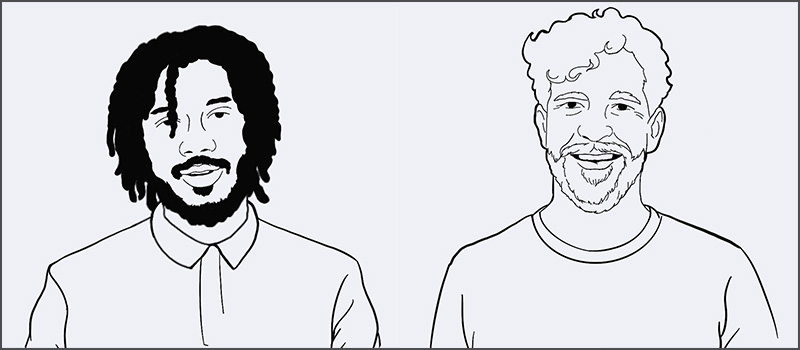300 episodes in, AirGo shows no signs of slowing down
July 21, 2022 — When Damon Williams ’14 and Daniel Kisslinger ’14 signed off as students from Grinnell College radio station KDIC back in 2014, their absence on the airwaves was short-lived.
By the following summer, they were back at 88.5 on the radio dial on Chicago’s WHPK with their show AirGo. Eight years and 300 episodes later, AirGo continues to create a living dialogue-based archive of Chicago’s creative communities and social movements.
 Daniel Kisslinger ’14, left, and Damon Williams ’14 speak at Signal Flow, a live in-studio event series with Chicago’s emerging artists.
Daniel Kisslinger ’14, left, and Damon Williams ’14 speak at Signal Flow, a live in-studio event series with Chicago’s emerging artists.
AirGo first hit the airwaves and web in July 2015. The previous year, in the aftermath of Mike Brown’s murder in Ferguson, Missouri, Williams began transporting supplies and resources to Ferguson and laying the groundwork for building what would grow into the #LetUsBreathe Collective. Kisslinger, who arrived in Chicago in fall 2014 after traveling around the country interviewing Grinnell alums for an audio documentary, began frequenting spoken word and poetry events, record releases, protests, and movement spaces. Kisslinger recalls that he and Williams were “in orbit of one another.”
In April 2015, after police officers killed Freddie Gray in Baltimore, Williams was at a protest pushing a dolly with a speaker rig and leading a chant. “It was a difficult balancing act,” he recalls. “This guy came up behind me and began pushing the cart. It was Daniel. There was real symbolism in that. He showed up, saw there was a need – a sound need at that.”
“If that’s not foreshadowing, I don’t know what is,” Kisslinger says. They joined up soon after. “Before comfort and friendship,” Williams says, “there was mutual respect and trust.”
With a chance to get back on the radio, Kisslinger recalls asking himself ‘Who do I want to be around? Who do I want to be in the trenches with? Who has a position that’s really different than mine in relationship to the people that we would be talking to?’”
Growing from conversation
AirGo started “as a love letter to a very specific context,” Williams says, the combined wave of poets, spoken word, and hip-hop artists and “radical upsurge of people throwing down politically” in Chicago. The intention was to create a kind of archive while documenting and building the kind of Chicago and wider world that they both wanted to see.
“It felt like we were observing people in Chicago who were historically significant, and we wanted to make sure that that there was at least an hour-long time capsule of people in this community processing their life, experiences, and what developed their relationship to the world,” Williams says.
 Kisslinger and Williams interview femdot, a Chicago rapper, during Signal Flow.
Kisslinger and Williams interview femdot, a Chicago rapper, during Signal Flow.
Williams credits Kisslinger with bringing the Chicago transplant lens to the show. Originally from the Bronx, Kisslinger was drawn to the work that was coming out of Chicago while he was at Grinnell. In featuring guests like organizer Mariame Kaba on the program, Kisslinger and Williams began to recognize that AirGo was becoming a kind of popular political education tool. Guests said things that were “changing and reshaping my understanding of things in real time on the radio,” Kisslinger says. “If I’m growing from this conversation, then that means our listeners have the potential to grow, too, and that was much more valuable to us than whatever clout we could get from interviewing an artist who’s about to blow up.”
That recognition, along with the changes within the Chicago community they had been documenting and the space to reflect, helped them make sense of how AirGo was changing.
“I think we both wanted all that was possible from this – to be heard, to be seen, to grow,” Williams recalls. “‘Oh man, we only have 200 listeners’ was difficult at first, but we calibrated our expectations and ideals, and understood who we are, what AirGo is, and what we’re doing. We exist in a specific context and that context is marginalized. They may be beautiful ideas and tendencies, but they’re not popular in the true sense of the word. Most people accept capitalism, most people aren’t looking for new ecological social structures, most people aren’t abolitionists. So we’re talking to and speaking with this specifically radical edge of what we want our society to be. That’s the point of why we need to do this. It’s fewer people, but we recognized and valued that 20 of those 200 listeners are willing to dedicate their time to changing the world.”
“Once we accepted that and moved in that way, way more people came to the show because we were doing it the right way,” Kisslinger adds.
‘The submerged part of the iceberg’
Another element of this change was more time facilitating workshops and producing live events in different spaces. Facilitation and particularly “the praxis” that comes from it brings the pair tremendous satisfaction. In 2016, Williams returned to Grinnell for a workshop called “Bigger than the Cops: Racialized State Violence and the Movement for Black Lives.”
“Preparing for workshops and facilitation really shows the submerged part of the iceberg,” Williams says, “the 90% of the concepts, ideas, and examples that we’ve dedicated work to. It shows that there’s been this internal growth, this centering, this grounding. I’m not just talking about the social politics, but how we relate dialogue, power, discourse, interaction, and relationship to these larger projects that have even longer-term visions. The work that people do to strive to an end goal like abolition or environmental justice is really daunting and heavy, but as a pre-step to that, we’ve been able to analyze the way in which people communicate and relate and how that communication creates new power dynamics or perpetuates existing dynamics that people are trying to subvert. That feels like a new space – one where I really can’t think of anyone else who can speak to it in the way that we do,” he says.
 Illustrations of Williams and Kisslinger appear on The Celebration Suite, which celebrates 300 episodes of AirGo by having comrades and compatriots interview the two Grinnellians.
Illustrations of Williams and Kisslinger appear on The Celebration Suite, which celebrates 300 episodes of AirGo by having comrades and compatriots interview the two Grinnellians.
Diving into the AirGo 300 episodes archive can be quite daunting. Do listeners start with Angela Davis, Hanif Abdurraqib (who gave Grinnell’s 2021 Mando Montano ’12 Memorial Lecture), or Robin D.G. Kelly? “Suites” – extended conversations on several different themes – have helped to organize AirGo’s vast archive and offer deeper dives on specific topics. During the pandemic, Kisslinger, Williams, and the AirGo team doubled their episode output. “We don’t always have the healthiest coping mechanism,” Kisslinger jokes.
The first “Suites” emerged in 2020. Their pandemic coverage, called “On The Line” refers to the frontline workers, educators, and mutual aid organizers they were speaking to. May and June saw a groundswell of organizing in the aftermath of George Floyd’s murder in Minneapolis.
“I had the bright idea of starting a citywide abolitionist campaign after a really impactful experience where I was abused by police violence in a protest and arrested,” Williams says. The urgency to do an AirGo series on abolition came out of a sense of responsibility, he says. “People were talking about abolition in ways that we didn’t expect to see for decades, honestly.”
The best entry point for the “Grinnell diaspora” is The Mentorship Suite, which features interviews with former Grinnell English associate professor Shanna Benjamin and two conversations with sociology and American studies associate professor Kesho Scott (Part One and Part Two).
“You’ll get a conversation about the space of Grinnell – how it shaped us and shaped our work,” Williams says about those episodes. “It was three Black women at Grinnell who shaped me – Lakeisha Johnson [associate professor of Gender, Women’s, & Sexuality Studies and English], Benjamin, and Scott. I want my work to be seen as part of their legacy.”
Few words can really capture how much gratitude Williams and Kisslinger have for these mentors. “The two-part conversation with Kesho Scott was one of the best conversations we’ve ever had on AirGo,” Williams says. “She came prepared to do the Kesho thing. It was warming and nostalgic, like a blanket.”
AirGo now stands at 304 episodes and shows no signs of slowing down. This fall, they’ll release their most ambitious project to date – an extensive audio documentary looking at the life and legacy of Chicago organizer Hazel Johnson, who’s known as the “Mother of Environmental Justice.”
“We want to provide people and community organizations with the support and resources to take up the mantle as media makers in their own rights and to make the projects that help further the fight,” Kisslinger says.
— by Joe Engleman ’14